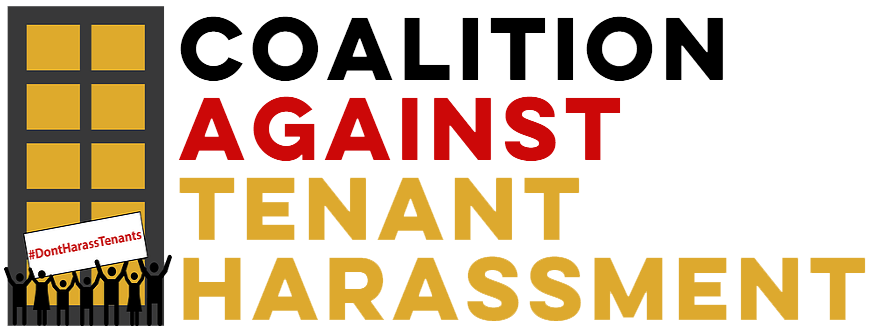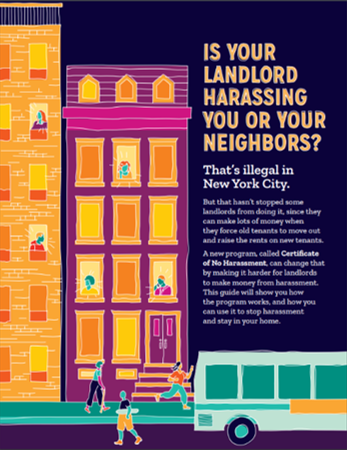Who We Are
From 2015 to 2022, CATHnyc operated as a city-wide coalition of community organizations and legal service providers fighting against the displacement of low-income tenants through organizing and by advocating for the Certificate of No Harassment (CONH) toprevent harassment and ensure tenants can stay in their homes. CATHnyc won a three-year pilot program of CONH in 2017 and the expansion of the program in 2021.
Coalition Members

During its operation, CATHnyc members included:
Association for Neighborhood and Housing Development
Housing Conservation Coordinators, Inc.
Metropolitan Council on Housing
What is the Certificate of No Harassment (CONH) Pilot Program?
 The CONH Pilot Program is intended to disincentivize tenant harassment and protect affordable housing by requiring landlords who want to make significant renovations in their buildings get a CONH from the NYC Office of Housing Preservation and Development (HPD) before certain construction permits through the NYC Department of Buildings (DOB) are approved.
The CONH Pilot Program is intended to disincentivize tenant harassment and protect affordable housing by requiring landlords who want to make significant renovations in their buildings get a CONH from the NYC Office of Housing Preservation and Development (HPD) before certain construction permits through the NYC Department of Buildings (DOB) are approved.
This three-year pilot program went into effect on September 28, 2018 and was expanded for an additional five years in 2021. It will next expire September 27, 2026.
You can learn more about how CONH works by downloading a copy of Is Your Landlord Harassing You or Your Neighbors? This illustrated, fold-out guide was created in collaboration with the Center for Urban Pedagogy, and it is also available in Spanish.
You can also read more about the CONH Pilot Program by vising the HPD website.
Timeline
-
2016: Community organizations and legal services providers come together to form CATHnyc.
-
November 2017: CATHnyc wins a huge victory with the passage of the CONH legislation, creating a three-year pilot program in some community districts (download a 2-pager summarizing the Pilot Program here).
-
2018: The CONH Pilot Program goes into effect.
-
2021: The CONH Pilot Program expired.
-
October 2021: CATHnyc wins a 5-year expansion of the CONH program, which now applies to all community districts, covers more buildings, and offers more benefits for tenants who participate.
CONH Pilot Program Buildings
More than 1,000 buildings, containing more than 25,000 apartments, across New York City are part of the CONH Pilot Program.
View HPD’s CONH Pilot Program Building List through NYC OpenData.
For Tenants
Tenant harassment is a common practice in New York City. You may have experienced tenant harassment if your landlord or someone they’ve hired has:
- Threatened you or used force against you
- Misled you about your building or tenancy status
- Stopped providing essential services, like heat and hot water
- Made repeated, intimidating, or unwanted buyout offers
For more examples of what tenant harassment looks like, see this resource: How to Spot Tenant Harassment
Tenants who experience harassment should keep track of what happens! That way, they’ll have proof to use in court or in an HPD investigation. Tenants can use this Harassment Log to track the harassment they’re experiencing.
How Can You Fight Back?
You’re not alone – If you’re experiencing tenant harassment, your neighbors probably are too. Talk to your neighbors and organize! For help with forming a tenant association and fighting back against tenant harassment in your building, contact an organization in your neighborhood:
City-Wide
Brooklyn
Manhattan
Housing Conservation Coordinators, Inc.
Northern Manhattan Improvement Corporation
The Bronx
Northern Manhattan Improvement Corporation
What can you do to get your building added to the CONH Pilot Program? The surest way to get your building added to the Pilot Program Building List is by proving – in court or with the New York State HCR – that harassment has happened in your building.
If your building is included in the CONH Pilot Program and you can prove that harassment has happened, you can prevent your landlord from getting permits to renovate your building.
Landlords may also try to avoid applying for a CONH by doing construction without a permit. This is likely dangerous and illegal! If you see construction happening in your building without the required permits, report it by calling 311. For more information on how to report a building construction problem, see the NYC 311 website.
For Organizers
If we want to stop tenant harassment, we must change landlord behavior! CONH punishes landlords for harassing tenants and has the potential to prevent tenant harassment in the future – But this program is only as effective as we make it. For more information about CATHnyc, the CONH Pilot Program, and how to fight harassment through tenant organizing, check out these resources:
For Attorneys
Legal services providers play a crucial role in the fight against tenant harassment and making the CONH Pilot Program a success! CATHnyc won significant changes to the legal definition of harassment, which was intended to make it much easier for tenants to prove they experienced harassment. Check out the current legal definition of harassment in subdivision 48 of § 27-2004 of the Administrative Code.
We also fought to make sure landlords feel the consequences of harassing tenants by automatically including buildings in the CONH Pilot Program if there is an HCR or court finding of harassment, and increasing the options for tenant compensation.
Tenant Harassment Should Not Pay
An Evaluation of the Certificate of No Harassment Pilot Program
The Coalition Against Tenant Harassment (CATHnyc) has released a new report – Tenant Harassment Should Not Pay: An Evaluation of the Certificate of No Harassment Pilot Program – that provides a comprehensive review of the Certificate of No Harassment (CONH) Pilot Program’s impacts and shortcomings. The results indicate clearly that CONH has the potential to be an effective tool in stopping tenant harassment – to achieve its intended impact, it will need to be both expanded and adjusted.
Click here to view the full report.
Click here to download the Executive Summary.
Click here to download our Full Recommendations.